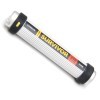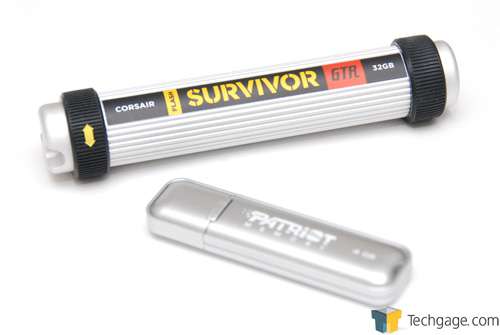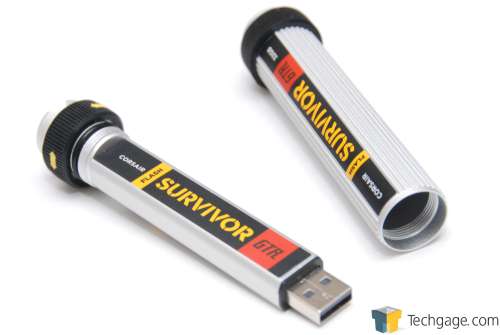- Qualcomm Launches Snapdragon 4 Gen 2 Mobile Platform
- AMD Launches Ryzen PRO 7000 Series Mobile & Desktop Platform
- Intel Launches Sleek Single-Slot Arc Pro A60 Workstation Graphics Card
- NVIDIA Announces Latest Ada Lovelace Additions: GeForce RTX 4060 Ti & RTX 4060
- Maxon Redshift With AMD Radeon GPU Rendering Support Now Available
Corsair Survivor GTR 32GB Flash Drive

As the market begins to fill up with USB 3.0 storage devices, it might seem like we’re nearing a USB 2.0 end. But that will still take some time, and as Corsair helps prove with its Survivor GTR, there’s still life left in the now-aging standard. Not only is this drive ultra-fast, but it’s also ultra-durable – giving you the best of both worlds.
Page 1 – Introduction
With the USB 3.0 standard having been launched last fall, it seemed like development for 2.0 devices would soon halt in order for companies to switch up their focus. Some might consider that to have already happened, but the truth is, we’ve been pushing the limits for USB 2.0 for quite a while where external storage is concerned, so for things to slow down is no surprise.
But that hasn’t stopped a couple of companies from continuing development to make sure that our 2.0 buses are still pushed hard. This past April, Corsair followed-up to its successful Survivor line with the GTR, a model that matches the Voyager GTR for offering nearly top-end specs that really prove just how much of a bottleneck USB 2.0 is.
Offering speeds of 34 MB/s read and 28 MB/s write, the Survivor GTR is hardly a slouch, and really, it’d be very difficult to find anything faster. Theoretically, there could be a drive with a slightly faster write speed, but those chips would likely be far more expensive, and the payoff not so much. When we’re already pushing 28 MB/s, the premium to see something even higher wouldn’t be worth it, especially when much faster USB 3.0 drives can be had that really blow the doors wide open on external storage performance.
When Corsair launched its first Survivor model in the fall of 2007, the company promised the most rugged flash drive available. Not long afterward, we found that to be true, with reviewers performing absolutely ludicrous tests on their samples, such as driving over them with an SUV, boiling them in hot water, and even microwaving them, only to have the drives still work afterward. Sure, they can get banged up, but the fact that the drives consistently survive such brutality speaks for itself.
As follow-up Survivor models came to fruition, not too much changed aesthetically or design-wise, as the original vision proved to be nearly as effective as could be. Instead, the focus changed to performance, and as we’ll soon see, today’s GTR is unbelievably fast – at least where USB 2.0 is concerned. Because the Survivor is built to withstand some rather intense punishment, it needs to have some bulk to it. In the above photo, you can see it sitting next to a generic thumb drive of an average size. There’s just no comparison… the GTR is a monster.
To better explain how the Survivor is designed, I took an exploded view of the product which can be seen below. Unlike most thumb drives which simply feature a cap, the Survivor drive consists of two parts which screw into each other for the ultimate in security. In its closed state, the USB connector itself is as far away from the only opening as possible.
According to Corsair, the Survivor is built with aircraft-grade aluminium, and I believe it. If you took a hammer to an airplane, I’d believe it would be easier to dent than this Survivor drive. For divers, it’s even water-proof for up to 200ft, thanks to the EPDM rubber seal. You could keep this drive submerged for weeks and water shouldn’t be able to get inside… it’s a very tight seal.
Though the drive is durable as is, Corsair has also added two rubber bands on each end that will help dampen any blow. The only thing I could think that could possibly make this drive any more durable would be to lace the inside with rubber as well, but at that point it seems like overkill, given that even when dropped, the aluminium frame of the drive itself shouldn’t bend or bounce.
|
Series
|
Read
|
Write
|
USB
|
Density (GBs)
|
Price
|
Warranty
|
| Survivor |
22 MB/s
|
13 MB/s
|
2.0
|
32GB, 64GB
|
~$100 (32GB)
|
10 Years
|
| Survivor GT |
30 MB/s
|
16 MB/s
|
2.0
|
32GB, 64GB
|
~$100 (32GB)
|
10 Years
|
| Survivor GTR |
34 MB/s
|
28 MB/s
|
2.0
|
8GB, 16GB, 32GB, 64GB
|
~$100 (32GB)
|
10 Years
|
To help get a basic understanding of how the Survivor series has improved over time, all you need to do is look at the read and write speeds. The initial version read at 22 MB/s and wrote at 13 MB/s, while the GT improved on both a fair bit. The GTR, though, almost doubles the write and pushes the read to what we believe to be the absolute real-world 2.0 limit.
You might notice that pricing for all three versions are pretty much identical, and the reason is simply supply and demand. It’s clear that Corsair is slowly ridding out the original Survivor and also the GT, as at this point in time, it seems really needless to offer so many different USB 2.0 models. For at least a 32GB model, the only real choice for your perusal is the GTR.
For this article, we’re not going to brutalize the GTR as is common of many other reviews, because as it is, the point that this drive is durable has been proven time and time again, and there’s no real reason to reinvent the wheel. I have little doubt that this is the most durable flash drive on the market, and if I were personally looking for one with that being a requirement, the Survivor is a no-brainer. It’s hardcore in both durability and performance.
Can Corsair’s Survivor GTR tear up our performance charts as well as it could tear itself up and still function? We’ll find out over the next couple of pages.
Support our efforts! With ad revenue at an all-time low for written websites, we're relying more than ever on reader support to help us continue putting so much effort into this type of content. You can support us by becoming a Patron, or by using our Amazon shopping affiliate links listed through our articles. Thanks for your support!







